William MacAskill
description: a philosopher and one of the founders of the effective altruism movement
23 results
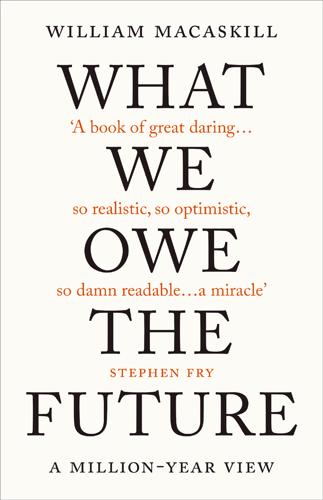
What We Owe the Future: A Million-Year View
by William MacAskill · 31 Aug 2022 · 451pp · 125,201 words
Also by William MacAskill Doing Good Better For my parents, Mair and Robin, and their parents, Ena and Tom and Daphne and Frank, and . . . Contents PART I. THE LONG
…
moral evolution, 70 Yan, John, 239–240 Yemen: abolition of slavery, 69–70 Yglesias, Matt, 93 Afterwards A story of a good future. For Holly William MacAskill is an associate professor in philosophy and senior research fellow at the Global Priorities Institute, University of Oxford. At the time of his appointment, he
…
published 2022 Published by arrangement with Basic Books, an imprint of Perseus Books LLC, a subsidiary of Hachette Book Group, Inc. Copyright © William MacAskill 2022 The moral right of William MacAskill to be identified as the Author of this work has been asserted by him in accordance with the Copyright, Designs, and Patents Act
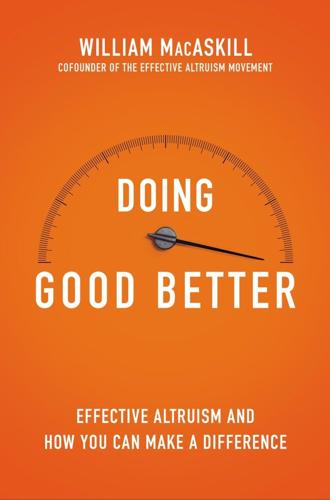
Doing Good Better: How Effective Altruism Can Help You Make a Difference
by William MacAskill · 27 Jul 2015 · 293pp · 81,183 words
times hilarious. I couldn’t put it down. This book will change your life.” —Nick Cooney, author of How to Be Great at Doing Good “William MacAskill shows that we can make a surprisingly large life-changing difference to those in disadvantaged parts of the world—provided that our altruistic impulses are
…
Cognition Lab and author of Moral Tribes An imprint of Penguin Random House LLC 375 Hudson Street New York, New York 10014 Copyright © 2015 by William MacAskill Penguin supports copyright. Copyright fuels creativity, encourages diverse voices, promotes free speech, and creates a vibrant culture. Thank you for buying an authorized edition of
…
Penguin Random House LLC. LIBRARY OF CONGRESS CATALOGING-IN-PUBLICATION DATA MacAskill, William. Doing good better : how effective altruism can help you make a difference / William MacAskill. pages cm Includes bibliographical references and index. ISBN 978-0-698-19110-5 1. Altruism. 2. Helping behavior. I. Title. HM1146.M33 2015 171'.8
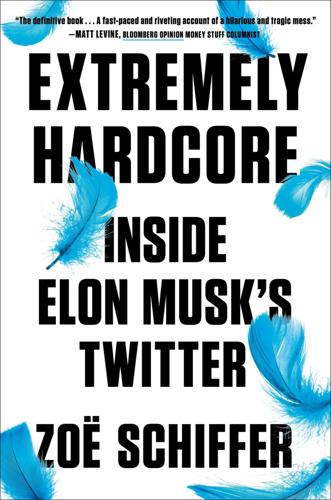
Extremely Hardcore: Inside Elon Musk's Twitter
by Zoë Schiffer · 13 Feb 2024 · 343pp · 92,693 words
be important. Please vote carefully.” More than two million accounts voted, with 70 percent saying no. Musk’s free speech poll piqued the interest of William MacAskill, a Scottish philosopher and architect of the effective altruism movement, which takes a utilitarian approach to philanthropy in an effort to maximize the benefit of
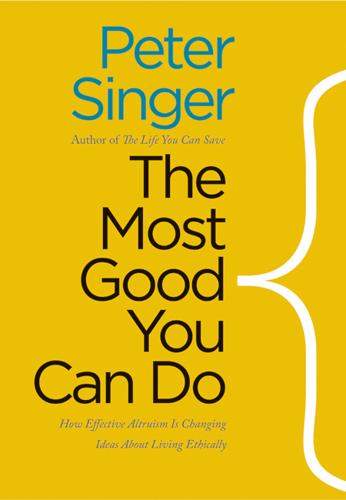
The Most Good You Can Do: How Effective Altruism Is Changing Ideas About Living Ethically
by Peter Singer · 1 Jan 2015 · 197pp · 59,656 words
pushed the £18,000 back up to nearly £20,000. 8. http://www.givingwhatwecan.org (October 25, 2014). 9. http://80000hours.org/about-us. 10. William MacAskill, “The History of the Term ‘Effective Altruism,”’ March 10, 2014, http://www.effective-altruism.com/the-history-of-the-term-effective-altruism/. 11. http://www
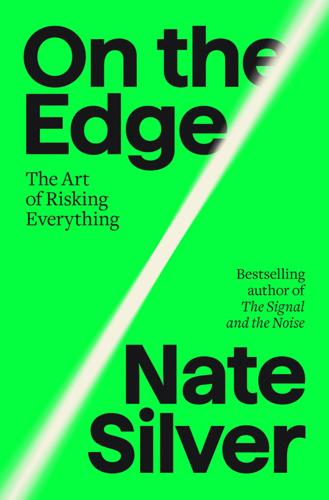
On the Edge: The Art of Risking Everything
by Nate Silver · 12 Aug 2024 · 848pp · 227,015 words
about $30,000: Nanina Bajekal, “Inside the Growing Movement to Do the Most Good Possible,” Time, August 10, 2022, time.com/6204627/effective-altruism-longtermism-william-macaskill-interview. GO TO NOTE REFERENCE IN TEXT hosted by Sam Bankman-Fried: SBF was described as the host in the invitation that MacAskill emailed to
…
Risk and Uncertainty 27, no. 1 (2003): 5–76, doi.org/10.1023/A:1025598106257. GO TO NOTE REFERENCE IN TEXT “Definition of Effective Altruism”: William MacAskill, “The Definition of Effective Altruism,” in Effective Altruism, ed. Hilary Greaves and Theron Pummer (Oxford: Oxford University Press, 2019), 10–28, doi.org/10.1093
…
Cowen on Effective Altruism.” GO TO NOTE REFERENCE IN TEXT MacAskill have answers: Will MacAskill, Toby Ord, and Krister Bykvist, “About the Book: Moral Uncertainty,” William MacAskill, williammacaskill.com/info-moral-uncertainty. GO TO NOTE REFERENCE IN TEXT “essentially back-of-the-napkin”: David Kinney, “Longtermism and Computational Complexity,” EA Forum, August
…
-a-r. GO TO NOTE REFERENCE IN TEXT even their planet: Tyler Cowen and Will MacAskill, “William MacAskill on Effective Altruism, Moral Progress, and Cultural Innovation (Ep. 156),” Conversations with Tyler, July 7, 2018, conversationswithtyler.com/episodes/william-macaskill. GO TO NOTE REFERENCE IN TEXT “gathering of forecasting nerds”: Manifest 2023, 2023, manifestconference.net
…
TEXT critical of the movement: Alexander, “In Continued Defense of Effective Altruism.” GO TO NOTE REFERENCE IN TEXT didn’t think EAs: Cowen and MacAskill, “William MacAskill on Effective Altruism, Moral Progress, and Cultural Innovation.” GO TO NOTE REFERENCE IN TEXT rationalists like Hanson: Robin Hanson, “16 Fertility Scenarios,” Overcoming Bias (blog
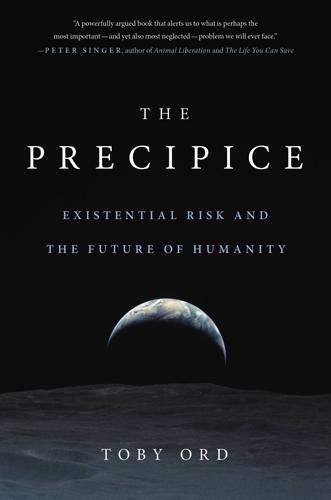
The Precipice: Existential Risk and the Future of Humanity
by Toby Ord · 24 Mar 2020 · 513pp · 152,381 words
that they can help reduce, but only we can reduce the risks being posed now and in coming decades. 27 The name was coined by William MacAskill and myself. The ideas build on those of our colleagues Nick Beckstead (2013) and Nick Bostrom (2002b, 2003). MacAskill is currently working on a major
…
how much they lower longterm risk. Potential examples include developing advanced artificial intelligence or centralizing control of global security. 7 The name was suggested by William MacAskill, who has also explored the need for such a process and how it might work. Nick Bostrom (2013, p. 24) expressed a closely related idea
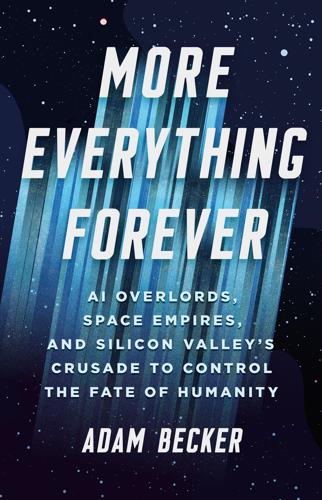
More Everything Forever: AI Overlords, Space Empires, and Silicon Valley's Crusade to Control the Fate of Humanity
by Adam Becker · 14 Jun 2025 · 381pp · 119,533 words
probably best known for his views on animal rights. But it was his argument for giving more to charity that had the most influence on William MacAskill—Will—and a small group of his fellow philosophers. In 2009, while in graduate school at Oxford, MacAskill cofounded the nonprofit Giving What We Can
…
—all EA-affiliated institutions. Several dozen people work here, mostly graduate students and postdoctoral researchers, along with a smattering of permanent staff and faculty including William MacAskill, Toby Ord, Anders Sandberg, and Nick Bostrom.i It’s May 2023, and I’ve traveled here from California to talk with MacAskill, but he
…
, Ray Kurzweil, David Chalmers, Eliezer Yudkowsky, and the musician Grimes. Ord signed too, as did a notable former member of the FTX Foundation team: one William MacAskill.58 * * * “I was pretty alarmed by Bing.… I was not expecting 2023 to be the year where an AI chatbot was released by a major
…
, May 24, 2024, video call INTERVIEW REQUESTS Sam Altman (declined) Marc Andreessen (declined) Jeff Bezos (ignored) Nick Bostrom (declined) Eric Drexler (declined) Ray Kurzweil (declined) William MacAskill (canceled, ignored requests to reschedule) Elon Musk (ignored) Stuart Russell (declined) Scott Siskind (declined) Guillaume Verdon (ignored) USAGE PERMISSIONS AND IMAGE CREDITS “Torment Nexus” tweet
…
, “The Reluctant Prophet of Effective Altruism,” New Yorker, August 8, 2022, www.newyorker.com/magazine/2022/08/15/the-reluctant-prophet-of-effective-altruism. 3 William MacAskill (@willmacaskill), Twitter, November 11, 2022, https://twitter.com/willmacaskill/status/1591218022362284034. 4 Peter Singer, “Famine, Affluence, and Morality,” Philosophy & Public Affairs 1, no. 3 (1972
…
Prophet.” 11 “About Us: What Do We Do, and How Can We Help?,” 80,000 Hours, accessed June 12, 2024, https://80000hours.org/about/. 12 William MacAskill, “About William MacAskill,” accessed June 12, 2024, www.williammacaskill.com/press. 13 Naina Bajekal, “Want to Do More Good? This Movement Might Have the Answer,” Time, August
…
10, 2022, https://time.com/6204627/effective-altruism-longtermism-william-macaskill-interview/. 14 “History,” Centre for Effective Altruism, accessed June 12, 2024, www.centreforeffectivealtruism.org/history; “Oxford-Based Charity Receives More Than $2.5 Billion in
…
of Oxford, March 1, 2022, www.ox.ac.uk/news/2022-03-01-oxford-based-charity-receives-more-25-billion-pledges-community-effective-givers. 15 William MacAskill, What We Owe the Future (New York: Basic Books, 2022), 9. 16 Ibid., 5. 17 Ibid., 10. 18 Ibid., 13. 19 Ibid., 5, 27–28
…
that this was an intentional Star Trek reference, but alas—MacAskill confirmed it’s not.) 23 MacAskill, What We Owe, 253. 24 Hilary Greaves and William MacAskill, “The Case for Strong Longtermism” (GPI Working Paper No. 5-2021, Global Priorities Institute, June 2021), https://globalprioritiesinstitute.org/wp-content/uploads/The-Case-for
…
the Amazon page for What We Owe the Future: “What We Owe the Future,” Amazon, accessed March 24, 2023, www.amazon.com/What-Owe-Future-William-MacAskill/dp/1541618629. 30 Mixed and negative reviews: Regina Rini, “An Effective Altruist?,” Times Literary Supplement, September 9, 2022, www.the-tls.co.uk/articles/what
…
-we-owe-the-future-william-macaskill-book-review-regina-rini/; Émile P. Torres, “Understanding ‘Longtermism’: Why This Suddenly Influential Philosophy Is So Toxic,” Salon, August 20, 2022, www.salon.com/2022
…
of History,” Project Syndicate, October 8, 2021, www.project-syndicate.org/commentary/ethical-implications-of-focusing-on-extinction-risk-by-peter-singer-2021-10. 49 William MacAskill (@willmacaskill), Twitter (now X), November 11, 2022, https://twitter.com/willmacaskill/status/1591218030364995585. Note that in the next tweets in the thread, MacAskill cites himself
…
in Your Career. Here’s How to Do the Most Good with Them,” Vox, August 3, 2015, www.vox.com/2015/7/29/9067641/william-macaskill-effective-altruism. 55 William MacAskill, “Replaceability, Career Choice, and Making a Difference,” Ethical Theory and Moral Practice 17 (2014): 269–283, https://doi.org/10.1007/s10677-013
…
-9433-4. 56 William MacAskill, personal communication. 57 “Sam Bankman-Fried,” 80,000 Hours, archived June 13, 2021, at the Wayback Machine, https://web.archive.org/web/20210613111013/https://80000hours
…
Ord interview. 65 Nick Bostrom, “Existential Risk Prevention as Global Priority,” Global Policy 4, no. 1 (2013): 15–31, https://existential-risk.com/concept. 66 William MacAskill and Hilary Greaves, “The Case for Strong Longtermism” (working paper, Global Priorities Institute, June 2021), https://globalprioritiesinstitute.org/wp-content/uploads/The-Case-for-Strong
…
concerned about, by their own logic. 100 Armstrong and Sandberg, “Eternity in Six Hours.” 101 Carl Sagan, Cosmos (New York: Random House, 1980), 130. 102 William MacAskill, “Afterwards,” in What We Owe, posted to WhatWeOwetheFuture.com, accessed June 16, 2024, https://whatweowethefuture.com/afterwards/. 103 Kieran Setiya, “The New Moral Mathematics,” Boston
…
original). 111 Torres, interview with author, July 26, 2023. 112 Setiya, “New Moral Mathematics.” 113 Ibid. 114 MacAskill, What We Owe, 186. 115 Tyler Cowen, “William MacAskill on Effective Altruism, Moral Progress, and Cultural Innovation (Ep. 156),” August 10, 2022, in Conversations with Tyler, podcast, https://conversationswithtyler.com/episodes
…
/william-macaskill/. 116 MacAskill, What We Owe, 186–187. 117 Setiya, “New Moral Mathematics.” 118 MacAskill, “Afterwards” (emphasis in the original). 119 Setiya, “New Moral Mathematics.” 120
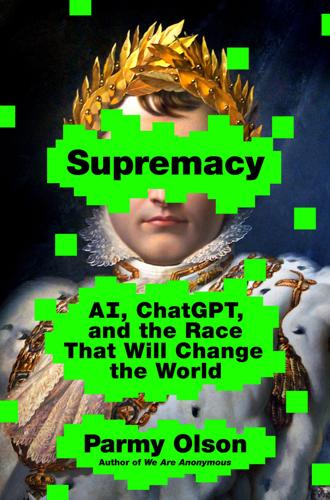
Supremacy: AI, ChatGPT, and the Race That Will Change the World
by Parmy Olson · 284pp · 96,087 words
into Anthropic come from Pitchbook, a market research firm. Details on Open Philanthropy’s grants and funding come from www.openphilanthropy.org/grants/. Texts between William MacAskill and Elon Musk are sourced from court filings that were released as part of a pretrial discovery process in a legal battle between Musk and
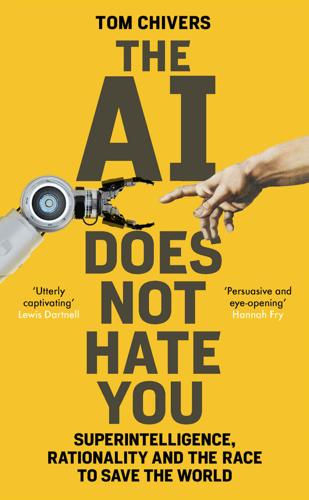
The Rationalist's Guide to the Galaxy: Superintelligent AI and the Geeks Who Are Trying to Save Humanity's Future
by Tom Chivers · 12 Jun 2019 · 289pp · 92,714 words
down and perhaps disappear entirely.’ Thirty-eight years after Singer wrote his essay, a small group of academics in Oxford, led by Toby Ord and William MacAskill, a professor of moral philosophy (at one point, the youngest associate professor in the world; he’s still only 32), took Singer’s ideas and
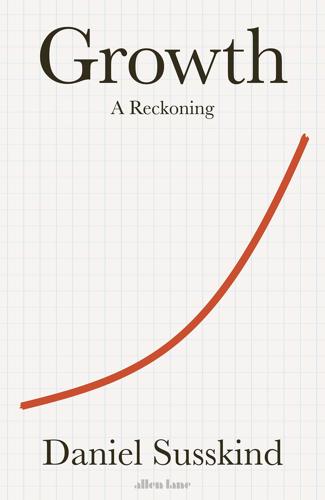
Growth: A Reckoning
by Daniel Susskind · 16 Apr 2024 · 358pp · 109,930 words
be the most consequential in the longer term – but it is also the one that tends to get neglected. Consider the work of the philosopher William MacAskill. In his influential book What We Owe the Future, he recognizes the importance of new ideas in driving growth, and considers how we might discover
…
, called it ‘a close match for my philosophy’).12 But it is also due to the stewardship of one of its standard-bearers, the philosopher William MacAskill, whose views on the limits to growth I explored in Chapter 8. MacAskill is also known for heading up another increasingly popular movement, ‘effective altruism
…
. I. Jones, ‘The Facts of Economic Growth’, in Handbook of Macroeconomics, Vol 2A., ed. John B. Taylor and Harald Unlig (Elsevier, 2016), p. 21. 61 William MacAskill, What We Owe the Future (London: Oneworld, 2022), p. 152. 62 MacAskill, What We Owe the Future, p. 153. 63 MacAskill, What We Owe the
…
of Communism (Oxford: Basil Blackwell, 1964), p. 253. 26 Derek Parfit, On What Matters, Vol. 2 (Oxford: Oxford University Press, 2011), p. 616. See also William MacAskill, ‘Are We Living at the Hinge of History?’, Global Priorities Institute Working Paper No. 12–2020 (2020). 27 Helmut Haberl et al., ‘A Systematic Review
…
Martin Weitzman, ‘Gamma Discounting’, American Economic Review, 91:1 (2001), p. 260. 12 twitter.com/elonmusk/status/1554335028313718784?lang=en (accessed 21 April 2023). 13 William MacAskill, What We Owe the Future (London: Oneworld, 2022). 14 MacAskill, What We Owe the Future. 15 MacAskill, What We Owe the Future, p. 9. 16
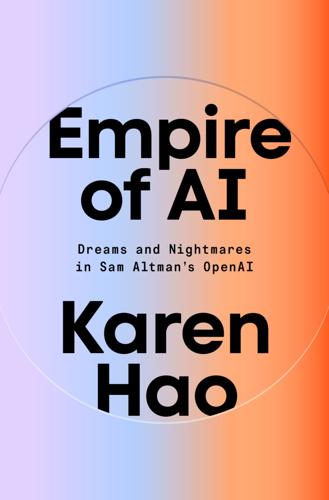
Empire of AI: Dreams and Nightmares in Sam Altman's OpenAI
by Karen Hao · 19 May 2025 · 660pp · 179,531 words
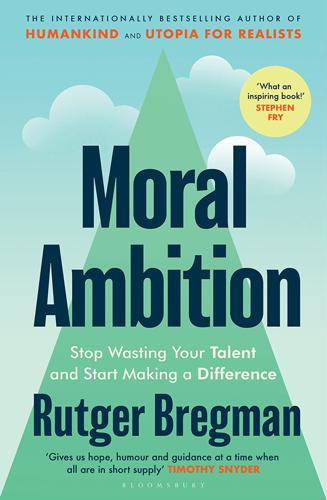
Moral Ambition: Stop Wasting Your Talent and Start Making a Difference
by Bregman, Rutger · 9 Mar 2025 · 181pp · 72,663 words
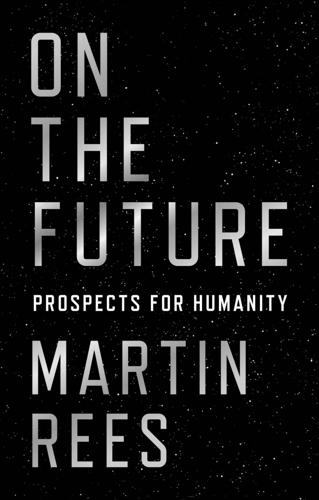
On the Future: Prospects for Humanity
by Martin J. Rees · 14 Oct 2018 · 193pp · 51,445 words
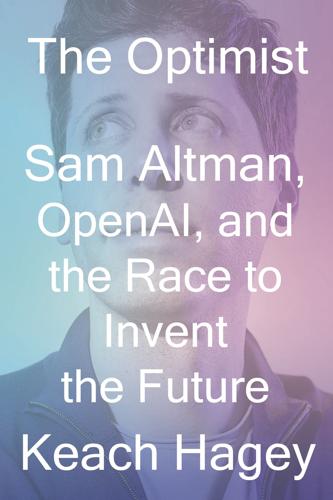
The Optimist: Sam Altman, OpenAI, and the Race to Invent the Future
by Keach Hagey · 19 May 2025 · 439pp · 125,379 words
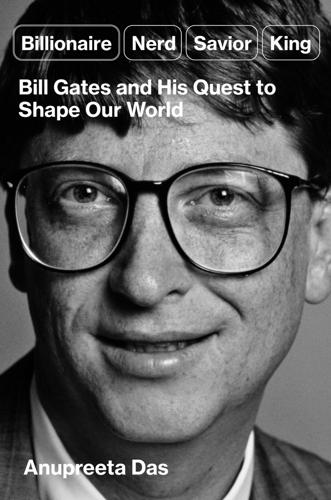
Billionaire, Nerd, Savior, King: Bill Gates and His Quest to Shape Our World
by Anupreeta Das · 12 Aug 2024 · 315pp · 115,894 words
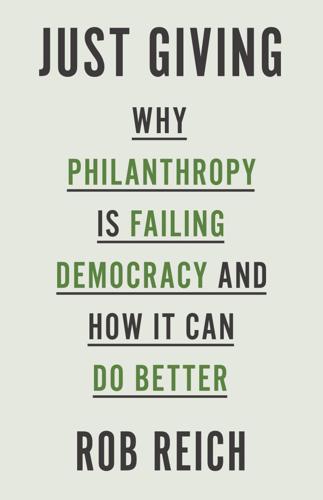
Just Giving: Why Philanthropy Is Failing Democracy and How It Can Do Better
by Rob Reich · 20 Nov 2018 · 257pp · 75,685 words
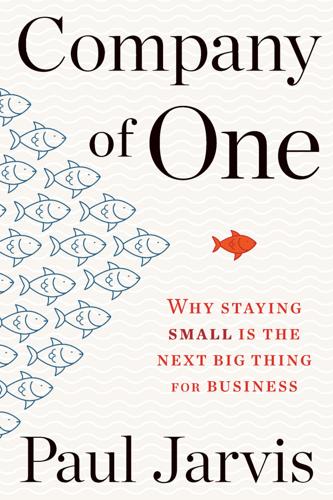
Company of One: Why Staying Small Is the Next Big Thing for Business
by Paul Jarvis · 1 Jan 2019 · 258pp · 74,942 words
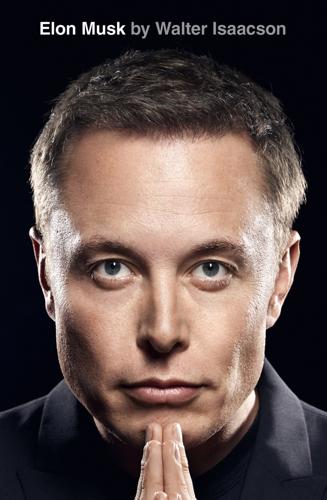
Elon Musk
by Walter Isaacson · 11 Sep 2023 · 562pp · 201,502 words
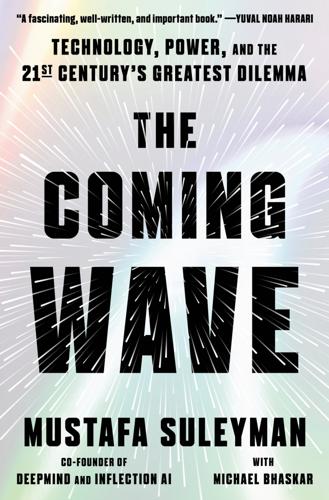
The Coming Wave: Technology, Power, and the Twenty-First Century's Greatest Dilemma
by Mustafa Suleyman · 4 Sep 2023 · 444pp · 117,770 words
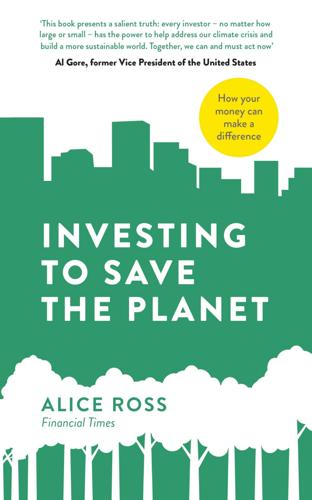
Investing to Save the Planet: How Your Money Can Make a Difference
by Alice Ross · 19 Nov 2020 · 197pp · 53,831 words
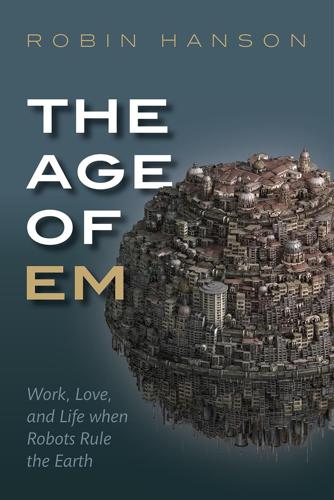
The Age of Em: Work, Love and Life When Robots Rule the Earth
by Robin Hanson · 31 Mar 2016 · 589pp · 147,053 words
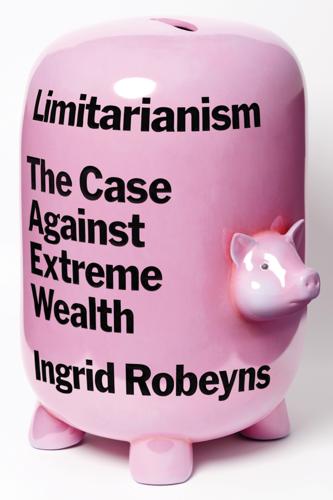
Limitarianism: The Case Against Extreme Wealth
by Ingrid Robeyns · 16 Jan 2024 · 327pp · 110,234 words
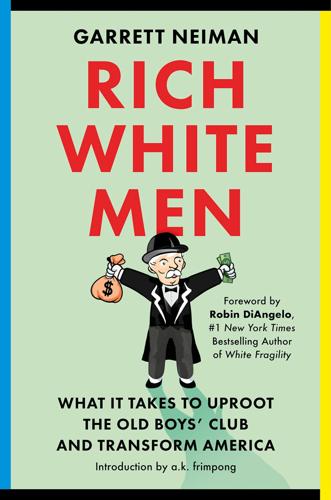
Rich White Men: What It Takes to Uproot the Old Boys' Club and Transform America
by Garrett Neiman · 19 Jun 2023 · 386pp · 112,064 words